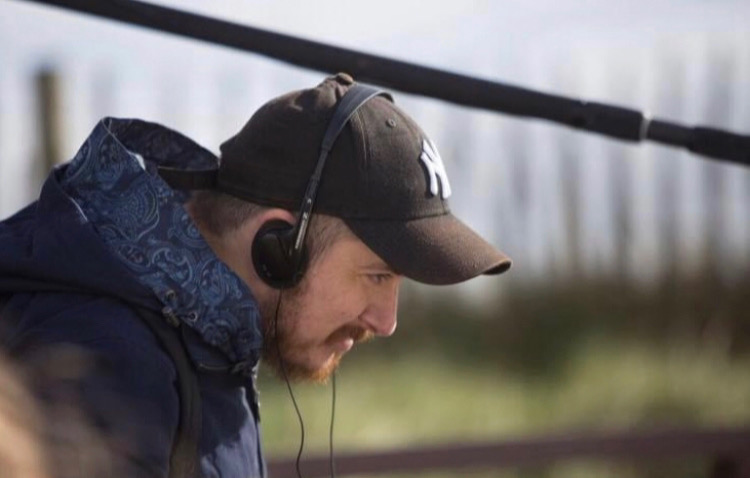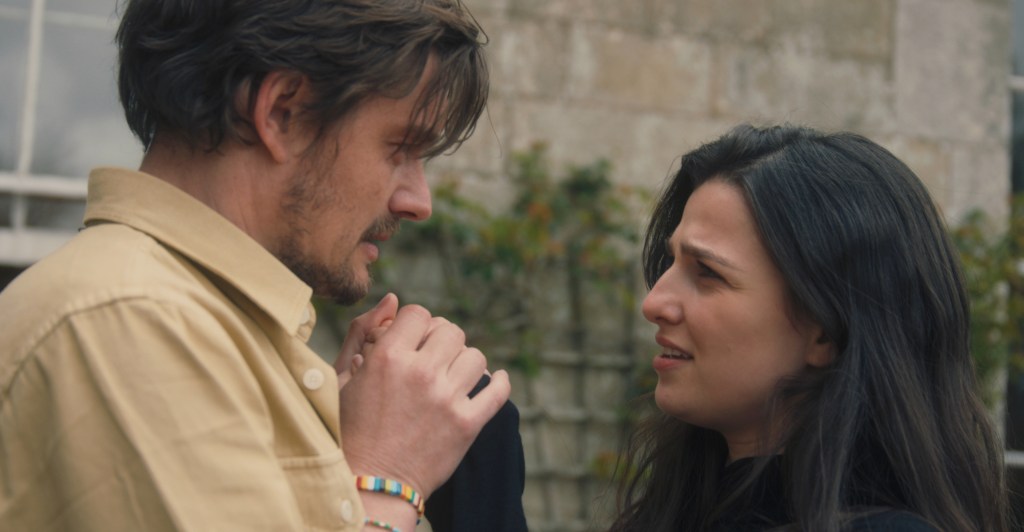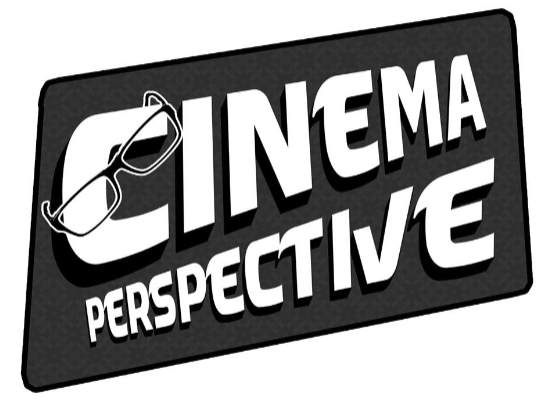
Since making his feature debut Benny & Jolene in 2014, Welsh writer and director Jamie Adams has racked up a whopping nine films! His process is very fluid and improvisational, crafting films on a low budget over a very short period of time and with no script in the traditional sense. His latest effort is romantic drama She is Love, which features a trio of terrific performances from Haley Bennett, Sam Riley, and Marisa Abela. I was fortunate enough to sit down with the prolific filmmaker to chat about the film…
It feels like a very long time since our last conversation, back when you had just made your festive film A Wonderful Christmas Time in 2014. How have you, your process, and your films changed in that time?
I’ve got older, more cynical, and more tired, so the process has changed. The truth of it is that every project is different. There’s different people involved; there’s different cast, crew, and their personalities, and you’re balancing all of that. You’re balancing the budget, the schedule, the scope of the vision. You’re balancing the story you want to tell versus what you’re able to tell.
You get more comfortable with the process like a sports person when they get into a routine of some kind; this is what I do when I’m preparing, this is what I do when I’m in the game, this is what I do afterwards. I can look back at something like A Wonderful Christmas Time for example, which is the second feature that we did in this way, and I could see myself mumbling on set as you’re not as confident about what you’re doing because you’re still finding it. You’re always still finding it, but at least you have more of a clue of how you’ll get to what it is you’re looking for.
In terms of the way you make your films, I remember you saying you work not with a script or treatment but with a scriptment. Did you apply the same method with She is Love and can you elaborate on how this style comes together?
Yes, and I remember watching Le Donk & Scor-zay-zee (2009 music mockumentary) which was made over a weekend and noticed that some mumblecore stuff was made over a weekend, I realised I had the energy and the capability to do it that way too. Part of the attractiveness of the pitch is you only have to spend a week away from your families, and that’s not something that’s offered a lot. That process gives us the opportunity to be able to continue to tell these stories and it creates such an original atmosphere on set and there’s an energy that doesn’t exist anywhere else. Everybody is thoroughly involved in the storytelling from the moment we get on set, and actors seem to respond really well to them.

That must create an exciting sense of spontaneity on set. For this shoot, you only have one key location and a handful of characters. Was that always the intention or was the stripped back approach a result of COVID restrictions etc?
I started talking to Sam Riley about this idea during the lockdown and was able to get in touch with Haley Bennett because she liked my previous work. It naturally, organically came together but the pandemic changed everything as it became much more of a sort of nuclear economy. I think there were five cast members altogether, and one of them even got cut down quite a lot. Originally, I think there were 12 characters. Filmmaking is always about resources and taking what’s available. It’s about accepting what’s available and using those parameters to the best that you can and that’s why I love working this way.
Did you have any key influences or inspirations for how you wanted the film to look?
Our DOP Jan Vrhovnik is brilliantly talented, and I saw his documentary work and thought that he was able to do what I always look for, which is to have really poignant visual storytelling, but also keeping it contemporary. I always refer to Cassavetes as a huge influence but it’s kind of Cassavetes meets like, romantic comedies from Adam Sandler or Ben Stiller, you know, the real commercial romantic comedies. It’s like how Woody Allen used to have a great DOP like Gordon Willis and marry his style into what is essentially a romantic comedy. There’s a European sensibility that comes from Yan as much as it comes from me, but I love Father of the Bride as much as I love Fellini’s 8 ½ so we’re trying to get that balance.
You always pull together amazing casts for your films and this is no different. I want to ask you about Marisa Abela in particular. I think she’s brilliant in HBO’s Industry and of course she’s been in the press this past few weeks with the news that she’ll play Amy Winehouse in an upcoming biopic. Can you talk about your experience working with her?
I did some second unit directing on Industry during the first series. It was very minimal but in a few scenes I got to work with Marisa and also Myha’la Herrold who plays Harper. I was just immediately taken with Marisa’s ability to become the character, which sounds redundant, but there are lots of actors who genuinely just are their characters. With Haley Bennett, you give her a character for a few days and you will not recognise her. She’s in The Girl on the Train, The Magnificent Seven, Music & Lyrics, and they’re all very different Haley Bennett performances.
I think that Marisa follows Hayley in that sense, and she was excited by the idea of going to Cornwall for a week to shoot. After some Zoom rehearsals you could just see the graciousness of Marissa as a performer. She’s a great listener and has great respect for actors and their craft. Instead of trying too much or going too hard, she listens and responds. By the end, she said that the filmmaking experience for her was completely different to anything else that she’d ever done. Now she’s doing a Sam Riley and playing one of the biggest musicians of all time, and she’s going to smash it out the park.

I know that in the past decade or so, your films have often screened at Edinburgh International Film Festival. Being my local festival, it’s an important one for me and I assume it is for you too. What are your feelings around the uncertain future of the festival due to the sad news of CMI going into administration?
It’s incredibly sad. It’s the oldest film festival in the world and that’s something to be proud of, as well as the quality of the festival itself. I remember I was at London Film Festival to see Craig Roberts’s movie Phantom of the Open, and I was there with Jay Duplass. He’d asked me if people in the UK consider London to be a bigger festival than Edinburgh because from an American point of view or, his specifically, it was all about Edinburgh. I feel like within the indie community, Edinburgh Film Festival is absolutely the pinnacle of where you want your film to be going. When Mark Adams was there as Artistic Director, he was just so great at giving opportunities to films and filmmakers that wouldn’t necessarily have had the opportunity before. He was an early supporter of those low-budget indie films I was making and one of the reasons I carried on actually making films was the opportunity for them to be at Edinburgh. I feel very fortunate that the tastemakers at the time really liked what we were doing and supported it. We’ll always be grateful for that and I just hope that other filmmakers get the same opportunity.
If I can put you on the spot and ask you to choose three actors, from the past or present, to be in your dream film to direct, who would you choose?
This is difficult. I’ve worked with a lot of actors and if I don’t choose them in this Fantasy Three there’ll be some trouble. I think what I’ll say from the start is I’m not going to choose anybody I’ve worked with, to be democratic.
Adam Sandler. Jean Seberg, she’s wonderful. My third one would be Irène Jacob from The Double Life of Veronique, and also Three Colours: Red. I was lucky and fortunate to meet Irène Jacob when she worked on a thing called The Collection for Amazon in Swansea, and she told me plenty of stories about Krzysztof Kieslowski and various other directors. It was a magical few hours with her. So yeah, Irène Jacob, Jean Seberg and Adam Sandler. What a mix!
What’s coming next for you? I noticed on your IMDB that the next film is Real Love. What can you tell me about that?
I can tell you that Real Love was shot before She is Love! I’m working on it with Kevin Proctor, a brilliant producer who understands that my films have to be treated as their own thing. I’m spending time on that one, bringing in new thoughts and ideas on sound design that I haven’t necessarily worked with before. There’s new editing techniques that I’m looking into and things like that, so I’m excited about it. It’s got the most wonderful performances at the centre of it from Russell Tovey, Sian Clifford, and Ophelia Lovibond. They’re just brilliant. It was shot at the height of the pandemic in Margam, and it was a beautiful experience. There’s also three or four other stories I’m working on but one thing I’ve learned is that you can’t take anything for granted. You’ve got to celebrate this moment, right here, right now, with you. She is Love is out in cinemas. I don’t know how many cinemas but it has a theatrical release in the UK and the US which is rare for an independent movie like ours. We’re going to take our time to celebrate.
She is Love is in cinemas and on digital release from 3rd February 2023

